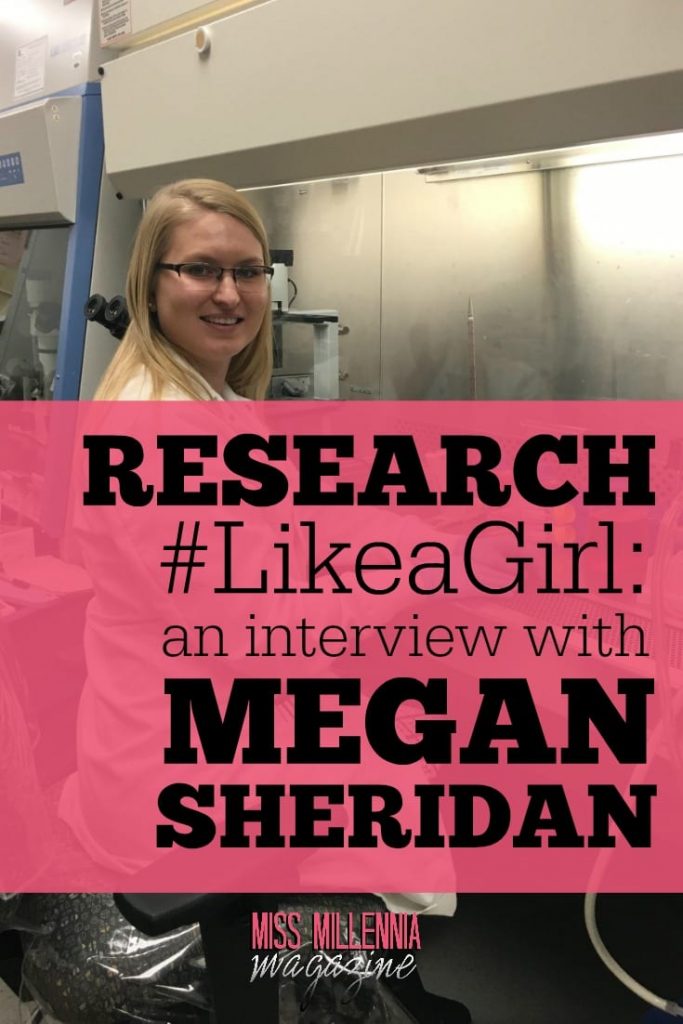Research #LikeaGirl: An Interview with Megan Sheridan
When the spring and summer months roll in, an increase in diseases caused by insect bites could be imminent, including Zika. Little is known about the stage at which pregnancies are affected by the virus and when the human fetus is most susceptible to brain abnormalities such as microcephaly.
Now, University of Missouri researchers found that the human fetus may be most vulnerable to Zika very early in pregnancy. Their findings are published in the most recent edition of the Proceedings of the National Academy of Sciences (PNAS). Let us hear from Megan as she shares her findings of their research on Zika virus and how it can be avoided especially to women who are in their early stage of pregnancy.
1. Hi, Megan! Tell us a bit about yourself.
I am currently in my fourth year of graduate school and am pursuing a Ph.D. in biochemistry. I am a Disney fanatic, Star Wars nerd, and dancer. I love to travel the world with my family! So far I have had the opportunity to travel to many countries including; Egypt, England, France, Germany, Switzerland & the Netherlands. I also have an amazing fur baby named Pookie, who is the recipient of most of my free time.
2. What made you interested in pursuing a career in science?
My love of science began my junior year of high school when I took AP Chemistry with Mr. Brothers at Wentzville Holt High School. Mr. Brothers taught with such a love and passion for science that I was immediately hooked (it didn’t hurt that I was good at it too!).
From there, I continued to pursue a bachelor’s degree in Biochemistry at the University of Missouri. Though there were many struggles along the way (particularly organic chemistry..ugh) I enjoyed my senior biochemistry laboratory class. This sparked my interest in pursuing a research-based career. Becoming a physician wasn’t the right fit for me, but I knew I wanted a career that could have the potential to help save lives. And that’s how I ended up at Mizzou in graduate school!
3. You’re currently conducting research on the Zika virus at the University of Missouri. How did you become interested in working on this particular project?
Our laboratory specializes in using stem cells to generate cells very similar to the cell types found in the human placenta. What makes our placental cell model unique is that it allows us to study what might be occurring during the first couple weeks of pregnancy. There is very little known about this point of pregnancy because it could never actually be studied in a human due to ethical reasons (and the fact that mothers would not even be aware they are pregnant at this time). The placenta is an amazing organ that only exists during pregnancy; it supports the babies’ growth and acts as the babies’ lungs, heart, liver, and kidneys until the baby is developed enough to support itself.
There is very little known about this point of pregnancy because it could never actually be studied in a human due to ethical reasons (and the fact that mothers would not even be aware they are pregnant at this time). The placenta is an amazing organ that only exists during pregnancy; it supports the babies’ growth and acts as the babies’ lungs, heart, liver, and kidneys until the baby is developed enough to support itself.
As you can imagine, this means that anything that goes wrong with the placenta would have grave consequences for the baby. Knowing all this, our lab became very interested in seeing how the Zika virus affects our placental cell model. Many researchers are looking at how Zika affects the placenta by using placentas that are collected after the baby is born.
This possesses some problems though because many of the epidemiological studies suggest that Zika only causes fetal microcephaly if the mother is infected during her first trimester. Therefore, we thought using our placental cell model would give us some insight into why the placenta is particularly susceptible to Zika infection early in pregnancy.
4. What has your research lab learned that could add to our knowledge of the Zika virus?
Our lab found something quite unexpected while working with the Zika virus. There are two major strains of Zika, one of African lineage and one of Asian lineage. The current outbreak in Brazil and other countries in Central and South America have been affected by the Asian lineage strains.
Interestingly enough, the African lineage strains have scarcely been researched, as they have only caused sporadic outbreaks in Africa during the 1950s-2000s. What our group immediately noticed is that when we infected our early placental cell model with the African strain of Zika, it killed the cells very rapidly.
Conversely, the Asian strain of Zika infected our placental cells but didn’t kill the cells as dramatically. This may suggest that the African strain of Zika is more dangerous, in the sense that it may destroy the placenta, which in turn, would cause the mother to lose her pregnancy.
5. Do you have any advice for women who are traveling to areas of the world that have higher rates of Zika?
When reviewing all of the published data on the Zika virus outbreaks, it seems like the most dangerous time for a mother to be exposed is during her first trimester of pregnancy and possibly even pre-conception periods. Considering how much is still unknown about Zika; especially the risk of any health issues for the infants later in life, which we won’t start learning about for many years, I would recommend that any woman who is pregnant or trying to conceive should avoid travel if possible. If travel isn’t avoidable make sure to avoid damp areas and wear repellant at all times!
6. What has your experience as a woman in STEM been like?
Overall I have had a very positive experience. I have been lucky to have many male and female mentors along the way that have fully supported me. My high school science teachers all pushed me to pursue science. One of my professors in undergrad encouraged me to apply for graduate school, and my current mentor(s) in graduate school are eager to help me continue moving forward in my field.
7. What are you looking forward to in the future of your career?
I am looking forward to the next step after graduation. I am hoping to complete an international postdoctoral fellowship. I am excited to take the opportunity to learn another field of research and also integrate myself into a new culture at the same time. My husband also enjoys the idea of moving out of the country to try something new! I hope to eventually find a faculty position that would allow me to continue scientific research and also work with students, as I enjoy teaching.
8. Can you share some words of wisdom with other women who are interested in pursuing a career in STEM?
I think it is important to surround yourself with a support system that fits your personal needs. If you have a bad advisor, that doesn’t support you or believe in you, don’t let that hinder your spirit or goals. Go out and seek an advisor that will support you and will encourage you. It is very important to have someone that will speak up for you and defend you, but remember that you are your best advocate and that you, above all, need to believe in yourself. If you continue to work hard, I firmly believe that it will pay off.
Thank you, Megan!
You can follow Megan on Twitter.










